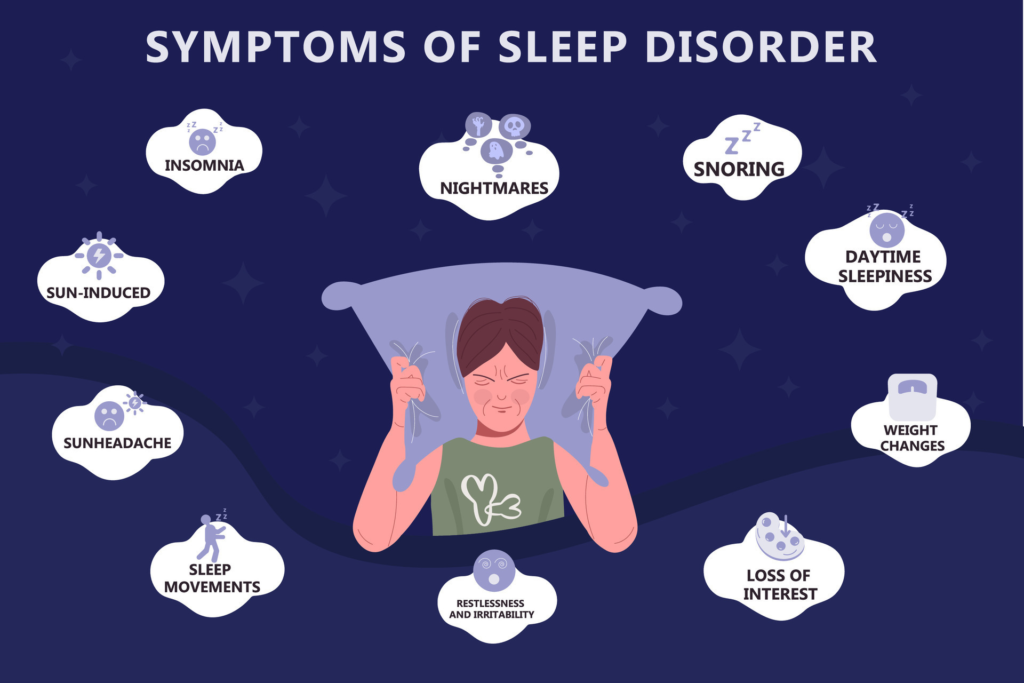
Introduction
Sleep is often regarded as the foundation of good health, yet its impact on mental wellbeing is frequently underestimated. Quality sleep plays a vital role in regulating emotions, enhancing cognitive function, and maintaining overall mental balance. Without sufficient rest, individuals may experience increased stress, anxiety, and difficulty concentrating, which can negatively impact their daily lives. Understanding how quality sleep supports mental health is essential for making informed lifestyle choices and prioritizing rest.

Table of Contents
Why Does Sleep Matter for Mental Health?
Sleep is more than just a time for rest; it is a crucial process that directly impacts mental health. During sleep, the brain works to consolidate memories, regulate emotions, and recharge for the challenges of the next day. A lack of quality sleep can disrupt these processes, leading to increased stress, mood swings, and even long-term mental health conditions like anxiety and depression. On the other hand, consistent, restful sleep supports resilience, focus, and emotional stability. Prioritizing sleep is not just about physical recovery—it’s an essential pillar of mental wellbeing.

How Does Sleep Support Mental Wellbeing?
Sleep plays a crucial role in maintaining mental wellbeing. It is essential for cognitive function, emotional regulation, and overall mental health. Adequate sleep supports various brain processes that enhance memory, mood, and the ability to handle stress, making it a foundational element of mental wellbeing.
1: Restores Cognitive Function
Sleep is essential for consolidating memories and enhancing learning. During deep sleep, the brain processes and stores information from the day. This process helps improve focus, decision-making, and problem-solving abilities. Lack of sleep can impair these functions, leading to forgetfulness, slower reaction times, and difficulty concentrating.

2: Regulates Mood and Emotions
Sleep influences the regulation of emotions. A good night’s rest can help stabilize mood, making it easier to cope with stress, anxiety, and negative emotions. On the other hand, sleep deprivation can lead to irritability, mood swings, and heightened emotional sensitivity. Chronic lack of sleep is also linked to an increased risk of mental health disorders such as depression and anxiety.

3: Improves Stress Resilience
Sleep helps the body and mind recover from the physical and emotional toll of stress. During sleep, the body produces and balances stress hormones like cortisol. Adequate sleep helps regulate cortisol levels, reducing the harmful effects of stress. Sleep also promotes relaxation, allowing the mind and body to recharge.

4: Supports Mental Health
Ongoing sleep disturbances are closely linked to mental health conditions such as depression, anxiety, and bipolar disorder. Proper sleep can serve as a preventive measure against these conditions, while consistent sleep deprivation can worsen symptoms and hinder recovery. By ensuring proper sleep, individuals can support long-term mental health.

5: Enhances Overall Mental Wellbeing
Beyond just alleviating stress or improving mood, sleep enhances overall mental wellbeing by allowing the brain to recharge. A rested brain is better equipped to face daily challenges, maintain positive relationships, and engage in meaningful activities. By prioritizing sleep, you can foster a stronger, more resilient mindset.

Conclusion
In summary, sleep is a cornerstone of mental wellbeing. It supports cognitive function, emotional regulation, stress resilience, and overall mental health. By making sleep a priority, individuals can enhance their mental health and enjoy a more balanced, stable life.

Signs of Poor Sleep That Affect Mental Wellbeing
Poor sleep can have a significant impact on mental wellbeing. Sleep is essential for emotional stability, cognitive function, and overall mental health. When sleep quality is compromised, it can manifest in several ways, affecting mood, behavior, and mental clarity. Recognizing the signs of poor sleep early can help mitigate its negative effects on mental wellbeing.
1: Difficulty Concentrating and Memory Problems
One of the first signs of poor sleep is a decline in cognitive function. Individuals may notice difficulty focusing, forgetfulness, and trouble retaining information. This is because sleep is crucial for memory consolidation and brain function. Without adequate rest, the brain struggles to process and store information efficiently, leading to cognitive impairments.

3: Mood Swings and Irritability
Lack of sleep can lead to significant mood changes. People who are sleep-deprived may experience increased irritability, frustration, or even sadness. Sleep is essential for emotional regulation, and without enough rest, the brain becomes more sensitive to stress, making it harder to manage emotions. Chronic poor sleep can increase the risk of developing mood disorders such as depression or anxiety.

4: Increased Anxiety or Stress
When sleep is compromised, the body’s stress response becomes more active, leading to higher levels of anxiety. Sleep deprivation affects the regulation of stress hormones like cortisol, making the body more vulnerable to stress. This can result in feelings of worry, unease, and heightened anxiety, which can further impact mental wellbeing.

5: Decreased Motivation and Productivity
Poor sleep can also affect motivation levels and overall productivity. Lack of rest can leave individuals feeling sluggish and unmotivated, leading to difficulties in completing tasks or pursuing goals. The brain needs adequate sleep to stay energized and focused, and without it, work performance and personal ambitions can suffer.

6: Trouble Making Decisions
Sleep deprivation impairs decision-making abilities as the brain struggles to assess situations clearly and rationally. Poor sleep affects the prefrontal cortex, the area of the brain responsible for complex thinking and decision-making. Individuals who are sleep-deprived may make impulsive choices or struggle to make sound judgments, which can affect both personal and professional decisions.

6: Increased Emotional Sensitivity
Those with poor sleep may find themselves becoming more emotionally sensitive. Small inconveniences or minor frustrations can feel overwhelming or upsetting. This is because sleep helps regulate emotional responses, and without sufficient rest, the emotional brain becomes more reactive, leading to disproportionate reactions to everyday events.

7: Physical Symptoms
Poor sleep doesn’t only affect the mind—it can also lead to physical symptoms that impact mental wellbeing. Chronic sleep deprivation can result in headaches, fatigue, and even weakened immune function, all of which can exacerbate feelings of stress and anxiety. When the body isn’t well rested, the mind also struggles to function properly.

Conclusion
In conclusion, poor sleep significantly affects mental wellbeing in numerous ways. From cognitive impairments and emotional instability to increased stress and decision-making difficulties, the signs of insufficient sleep are clear. If you recognize these signs in yourself, it’s important to address your sleep habits and seek strategies to improve your rest. Prioritizing sleep can help protect and enhance mental health, leading to a more balanced and productive life.

Tips to Improve Your Sleep for Better Mental Wellbeing
Good-quality sleep is vital for mental wellbeing. It enhances cognitive function, stabilizes emotions, and helps the body and mind recover from daily stresses. If you’re struggling with poor sleep, there are several practical steps you can take to improve your sleep habits and support your mental health. Here are some effective tips for better sleep.
1: Establish a Consistent Sleep Schedule
One of the simplest ways to improve your sleep is by setting a consistent bedtime and wake-up time. Going to bed and waking up at the same time every day helps regulate your body’s internal clock, making it easier to fall asleep and wake up naturally. Consistency improves the quality of your sleep, leading to better mental wellbeing.

2: Create a Relaxing Bedtime Routine
A relaxing pre-sleep routine signals to your body that it’s time to wind down. Activities like reading, taking a warm bath, or practicing mindfulness can help reduce stress and prepare the mind for rest. Avoid stimulating activities like working, using electronics, or watching intense shows right before bed, as these can interfere with your ability to fall asleep.

3: Optimize Your Sleep Environment
Your sleep environment plays a significant role in how well you sleep. Make sure your bedroom is quiet, dark, and cool. Using blackout curtains, earplugs, or a white noise machine can help create a calm atmosphere. A comfortable mattress and pillows also contribute to better sleep quality, which in turn supports mental wellbeing.

4: Limit Screen Time Before Bed
The blue light emitted by screens from phones, tablets, and computers can disrupt your sleep by interfering with the production of melatonin, a hormone that helps regulate sleep. Try to limit screen time to at least 30 to 60 minutes before going to bed to allow your body to naturally prepare for sleep.

5: Practice Relaxation Techniques
Practicing relaxation techniques such as deep breathing, meditation, or progressive muscle relaxation can help calm the mind and prepare your body for sleep. These activities reduce stress levels and lower heart rate, making it easier to drift off into a peaceful slumber, which supports mental wellbeing.

6: Limit Screen Time Before Bed
The blue light emitted by screens from phones, tablets, and computers can disrupt your sleep by interfering with the production of melatonin, a hormone that helps regulate sleep. Try to limit screen time at least 30 to 60 minutes before going to bed to allow your body to naturally prepare for sleep.

7: Practice Relaxation Techniques
Practicing relaxation techniques such as deep breathing, meditation, or progressive muscle relaxation can help calm the mind and prepare your body for sleep. These activities reduce stress levels and lower heart rate, making it easier to drift off into a peaceful slumber, which supports mental wellbeing.

8: Limit Naps During the Day
While naps can be refreshing, long or late-afternoon naps can interfere with your nighttime sleep. If you need to nap, try to keep it short (20-30 minutes) and earlier in the day to prevent it from impacting your ability to fall asleep at night.

9: Seek Professional Help if Needed
If you’ve tried these tips and still struggle with sleep, it may be time to consult a healthcare professional. Chronic sleep problems such as insomnia or sleep apnea can affect your mental wellbeing and may require professional treatment or therapy to improve.

Conclusion
Improving your sleep is essential for better mental wellbeing. By following these tips, you can enhance the quality of your sleep, reduce stress, and support emotional and cognitive health. A consistent routine, a relaxing environment, and healthy habits all contribute to restful nights and a more balanced, positive mindset.

Final Thoughts on Sleep and Mental Wellbeing
Sleep plays a fundamental role in supporting mental wellbeing. It directly influences cognitive function, emotional regulation, stress resilience, and overall mental health. Prioritizing good sleep habits can significantly improve your ability to manage daily challenges, enhance mood, and maintain a balanced mental state.
By recognizing the signs of poor sleep, you can take steps to improve your sleep quality. Whether it’s establishing a consistent sleep schedule, creating a calming bedtime routine, or optimizing your sleep environment, small changes can have a big impact on your mental wellbeing.
The Importance of Consistency
To support mental health, consistency in your sleep patterns is key. Maintaining a regular sleep schedule helps regulate your body’s internal clock, ensuring that you get restorative rest each night. The more consistent you are with your sleep habits, the better your brain and body can recharge, leading to improved focus, emotional stability, and overall wellbeing.

A Holistic Approach to Better Sleep
Improving sleep requires a holistic approach. It involves not just the right environment but also healthy lifestyle choices like regular exercise, limiting caffeine intake, and practicing relaxation techniques. Each element contributes to better sleep and, by extension, better mental wellbeing

Take Action for Better Sleep
If you’re struggling with poor sleep, start by implementing some of the tips outlined in this guide. Improving your sleep may take time, but with persistence and small adjustments, you can build habits that promote better rest and mental health. If sleep problems persist, consulting a healthcare provider can help address any underlying issues.

Conclusion
In conclusion, good sleep is a cornerstone of mental wellbeing. It not only helps restore your body but also enables your mind to function at its best. By prioritizing sleep and taking steps to improve it, you can enhance your mental health and lead a more balanced, fulfilling life.






